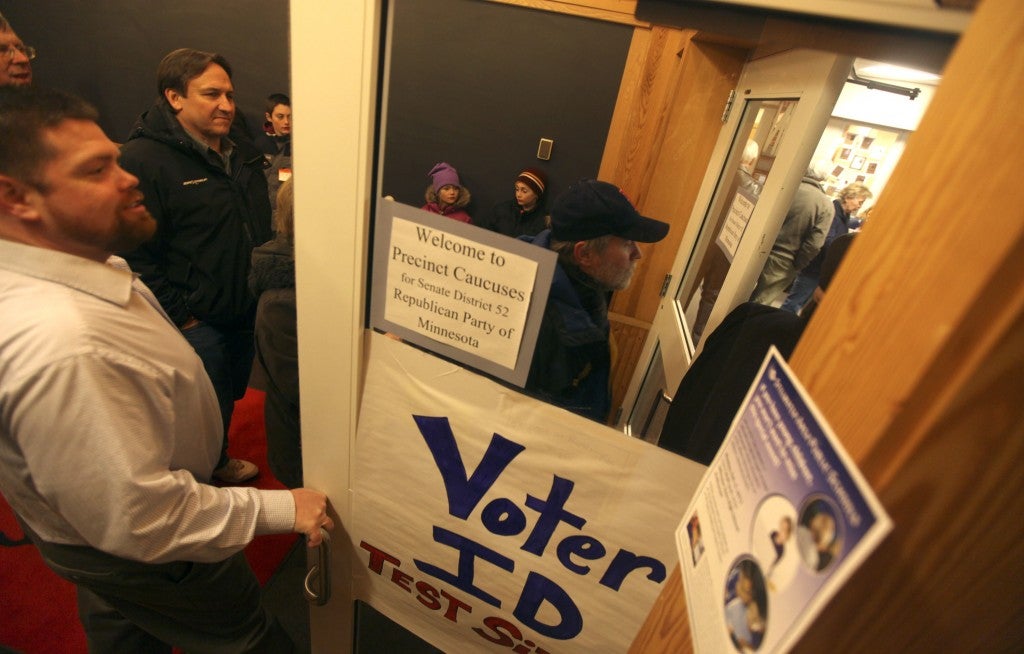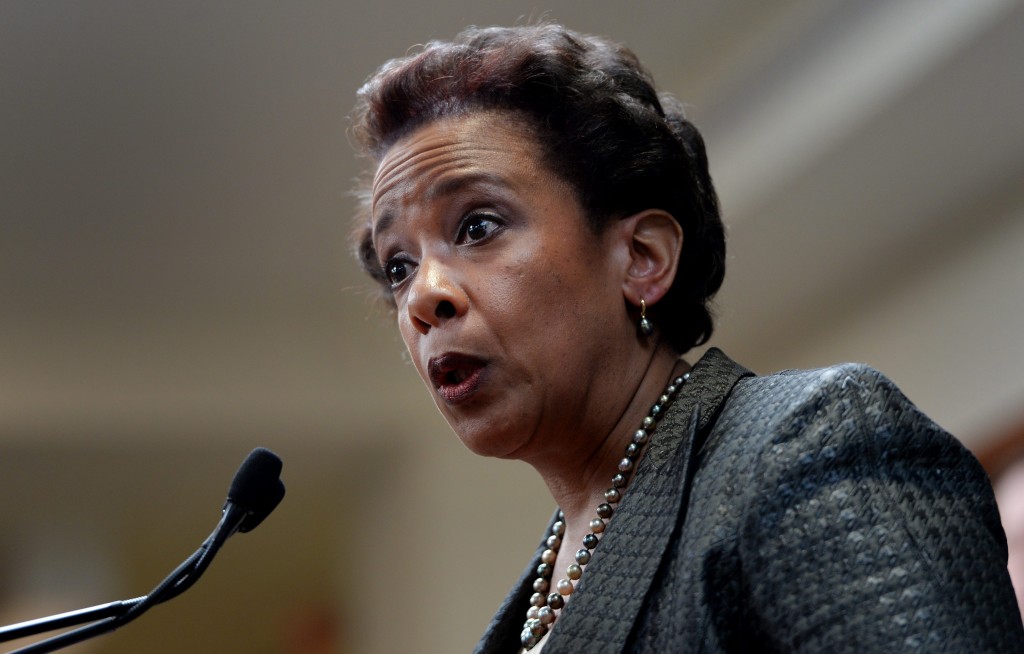The early signs are that Loretta Lynch may share some of the same troubling views as outgoing Attorney General Eric Holder.
That makes it even more important the Senate do a thorough review and vetting of her nomination by President Obama to be the new attorney general.
This is particularly true for those who understand how important the rule of law is to our constitutional system, something that Holder has damaged during his tenure.
Here’s a breakdown of where she stands on important issues for the next attorney general.
Lynch’s Views on Voter ID
Lynch, who is the U.S. attorney for the Eastern District of New York (which includes Brooklyn, Queens, Staten Island and Nassau and Suffolk Counties), has made it clear that she would continue Holder’s war on election integrity.
In a speech at the Long Beach Martin Luther King Center in New York in January, Lynch claimed that efforts to improve the integrity of the election process were an attempt “to take back” what Martin Luther King, Jr. had fought for and that state legislatures were trying to “reverse” the gains made in voting. Lynch made it clear she approved of the Justice Department’s lawsuits against states such as North Carolina to stop voter ID laws and changes in early voting and same-day registration rules, saying such suits “will continue.”
In her speech, Lynch apparently did not realize the irony of standing in front of a picture of Nelson Mandela while making this false claim against voter ID laws, given that South Africa has a much stricter voter ID requirement that was supported by Mandela. Members of the Senate owe it to voters to question Lynch intensely on this issue and should be troubled at the prospects of anyone who would continue Eric Holder’s policy of going after states for trying to protect the integrity of the election process.
Lynch and the Death Penalty
Lynch also apparently views the death penalty as racist. She is cited as saying in a 2002 roundtable discussion that she had to repeatedly “explain decisions not to seek the [death] penalty” when she was a prosecutor. She claimed that the relative ease with which the death penalty was applied against blacks and Hispanics suggested a systematic disregard for minority citizens. Lynch would not apply the death penalty even if all of the “problems” with it could be fixed, according to the article, simply because of its supposed disparate impact on minorities: “You can be as fair as possible in a particular case, but the reality is that the federal death penalty is going to hit harder on certain groups.”
Although the death penalty does not come up often in federal prosecutions, if Lynch was attorney general, she would be called upon to apply the death penalty in relevant cases, particularly terrorism prosecutions.
Given her opposition, senators have an obligation to find out whether Lynch would refuse to seek the death penalty as she apparently did as a prosecutor. Such action by an attorney general would be inappropriate and constitute a refusal to carry out the mandates established by the law.
Unfortunately, that racial attitude about voter ID and the death penalty may be a predominant feature of Lynch’s legal views. In April 2014, Lynch participated in a conference in New York City organized by the Justice Department’s Office of Community Oriented Policing Services office. The report issued by the COPS office on the conference had a list of “Action Items” that included the statement that “racial bias is pervasive” in our society, a claim that most Americans would disagree with and where the evidence is, at best, equivocal.
It is critical for members of the Senate to determine if Lynch shares the view that racial bias is pervasive in our justice system, because such a mistaken and profoundly jaundiced view might well shape her behavior as attorney general in the same negative way it has shaped Eric Holder’s behavior, to the detriment of the Justice Department and the interests of the fair and impartial administration of justice.
Lynch’s Perspective on Disparate Impact
The death penalty, voter ID and Lynch’s seeming-acquiescence to the recommended “Action Items” in the COPS report also bring into sharp focus an important issue: Lynch’s view towards the dubious legal theory of disparate impact that, as the Wall Street Journal has said, Eric Holder has used to “coerce settlements from banks and other businesses based on statistics but no proof of discrimination.”
In fact, a federal court just threw out the use of disparate impact with respect to the Fair Housing Act in a scathing decision in which the judge called the administration’s attempt to establish disparate impact as a legitimate legal theory as “chutzpah (bordering on desperation)” and “nothing less than an artful misinterpretation” of the law.
That opinion also sharply criticized the actions of another former Justice Department official, Thomas Perez, the current head of the Department of Labor, who also had been discussed as a possible replacement for Holder until Lynch got the nod. The court cited a congressional report that Perez placed “ideology over objectivity and politics over the rule of law” in settling a case raising this same issue in order to get the case off the Supreme Court’s docket.
Lynch needs to be questioned on whether she believes disparate impact is a legitimate legal theory under federal civil rights law and whether she believes that settling a case the U.S. Supreme Court had agreed to hear in order to avoid the court ruling on the legitimacy of that legal theory is acceptable behavior in a senior Justice Department official. The answer to both of those questions–or an attempt to avoid answering them–would be quite revealing about both her legal views and her ethical standards.
Lynch’s Role as a Holder Adviser
Lynch also has been a member of the attorney general’s advisory committee of U.S. attorneys. Given the criticism of Eric Holder’s behavior on a host of issues, from his refusal to defend the constitutionality of federal laws such as the Defense of Marriage Act, to his refusal over the past seven months to enforce the contempt citation issued by the House of Representatives against Lois Lerner in the IRS investigation, to his overly broad assertion of a privilege claim and refusal to turn over documents related to Operation Fast and Furious (including emails with his wife and mother), Lynch has an obligation to inform senators what advice, if any, did she give the attorney general with respect to those issues. Even if it turns out that she did not advise Holder on these issues, since she would occupy the same position he had, she should be asked whether she agreed and still agrees with those actions.
That brings up a subject raised by Sens. Ted Cruz, R-Texas, and Mike Lee, R-Utah. They recently called on Lynch to state “whether or not she believes the president’s executive amnesty plans are constitutional and legal.” One of the unique duties of the attorney general is his or her obligation to advise the president against taking actions that are unconstitutional or violate federal law. Lynch should be questioned about the president’s unilateral actions, including his actions on immigration, to see whether she actually believes in the limits the Constitution imposes on the executive, or whether she will simply step into Eric Holder’s shoes and help the administration continue to defy the rule of law.
Why the Attorney General Matters
The attorney general heads one of the most powerful executive branch agencies in the federal government–one that has enormous discretionary power to pursue people accused of breaking the law and to exert major influence over social, economic and national security policies by the choices its leader makes in enforcement. It requires someone who understands that while the attorney general is a political appointee, he or she has a sworn duty to uphold the Constitution and enforce the law in an objective, unbiased, nonpolitical manner.
The Senate, in its advice and consent role, also has an obligation to determine whether Loretta Lynch understands and will perform that duty before it decides whether to confirm her as the next attorney general of the United States.
































